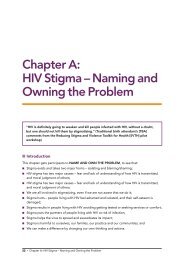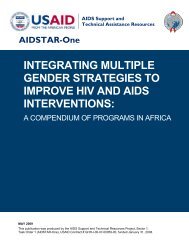Guide for Community Assessments on Women's Health Care - ICRW
Guide for Community Assessments on Women's Health Care - ICRW
Guide for Community Assessments on Women's Health Care - ICRW
You also want an ePaper? Increase the reach of your titles
YUMPU automatically turns print PDFs into web optimized ePapers that Google loves.
A1. HIV and AIDS and HIV Transmissi<strong>on</strong><br />
A Brief Definiti<strong>on</strong> of HIV and AIDS<br />
HIV stands <str<strong>on</strong>g>for</str<strong>on</strong>g> human immunodeficiency virus. If you are HIV-positive you are infected with this<br />
virus. Your body reacts by producing HIV antibodies. If you have access to an HIV blood test it will<br />
show these antibodies. If you are HIV-positive you may have no symptoms and may remain healthy<br />
<str<strong>on</strong>g>for</str<strong>on</strong>g> many years. However, no matter how well you feel, the virus remains in your body and can be<br />
passed <strong>on</strong> to other people.<br />
AIDS stands <str<strong>on</strong>g>for</str<strong>on</strong>g> acquired immune deficiency syndrome. If you are HIV-positive your immune system<br />
may be weakened, making you vulnerable to a group of illnesses (syndromes) that would not affect<br />
a healthy pers<strong>on</strong> without the virus. These illnesses include tuberculosis, some cancers, and eye, skin<br />
and nervous system c<strong>on</strong>diti<strong>on</strong>s. Though these can be serious, being diagnosed with AIDS does not<br />
mean you cannot recover your health. Many HIV-positive people have a serious illness, but recover<br />
and go <strong>on</strong> to live well. <br />
HIV Transmissi<strong>on</strong><br />
HIV can be transmitted through:<br />
●●<br />
●●<br />
●●<br />
●●<br />
●●<br />
unprotected (without a c<strong>on</strong>dom) vaginal or anal sex with some<strong>on</strong>e who is HIV-positive.<br />
sharing syringes and injecting equipment that have not been properly cleaned.<br />
c<strong>on</strong>taminated medical equipment that has not been properly cleaned.<br />
being given untested blood transfusi<strong>on</strong>s or blood products that are infected with HIV.<br />
d<strong>on</strong>or inseminati<strong>on</strong> with HIV-infected semen.<br />
Transmissi<strong>on</strong> of HIV from mother to baby can happen when:<br />
●●<br />
●●<br />
●●<br />
the virus is transmitted to the fetus across the placenta during pregnancy.<br />
the baby is infected during childbirth.<br />
the baby is infected through breast milk.<br />
Children also can get HIV from:<br />
●●<br />
●●<br />
●●<br />
receiving infected blood transfusi<strong>on</strong>s.<br />
receiving treatment with unsterile medical equipment such as needles, syringes or surgical<br />
instruments.<br />
suffering sexual abuse involving penetrative vaginal or anal sex.<br />
HIV is unlikely to be transmitted through oral sex, which is when some<strong>on</strong>e licks or sucks a man’s<br />
penis or a woman’s clitoris or vagina. Some people think there may be a slight risk if an HIV-positive<br />
man’s semen is swallowed. Even fewer people think there may be a small risk of transmissi<strong>on</strong> from<br />
an HIV-positive woman’s vagina if some<strong>on</strong>e is licking it. If an HIV-positive woman is menstruating, it<br />
is advisable to avoid unprotected oral sex.<br />
Compared to unprotected vaginal or anal penetrative sex, the risks of HIV transmissi<strong>on</strong> through oral<br />
sex are minimal. Some people prefer to use c<strong>on</strong>doms or latex barriers such as dental dams or plastic<br />
wrap when engaging in oral sex. Other people weigh the risks and decide that because they are so<br />
minimal, it is okay to go ahead without protecti<strong>on</strong>.<br />
Annex A: Fact Sheets 77

















